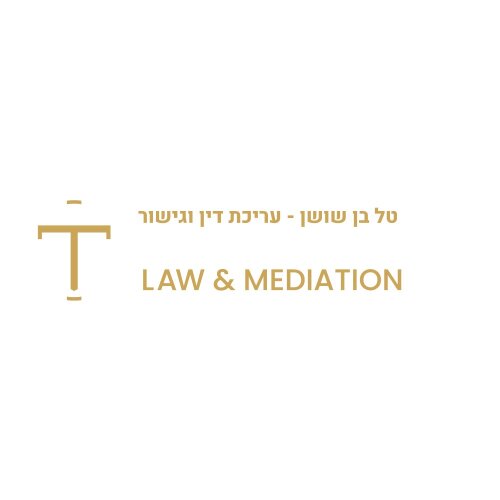Best Faith-Based Law Lawyers in Rishon LeZiyyon
Share your needs with us, get contacted by law firms.
Free. Takes 2 min.
List of the best lawyers in Rishon LeZiyyon, Israel
About Faith-Based Law in Rishon LeZiyyon, Israel
Faith-Based Law in Rishon LeZiyyon, a city located in central Israel, incorporates aspects of religious law within the Israeli legal system. The Israeli legal framework is unique as it integrates religious laws from different faiths, especially Jewish, Christian, and Islamic laws, into the civil legal system. This is particularly relevant in family law matters such as marriage, divorce, and inheritance. The religious courts have jurisdiction over these areas, while certain aspects may overlap with civil jurisdictions. In Rishon LeZiyyon, these laws reflect the city's diverse population and their respective faith traditions.
Why You May Need a Lawyer
There are several scenarios where individuals might require legal assistance related to Faith-Based Law. These may include:
- Marriage and Divorce: Navigating the religious and civil components of marriage or divorce.
- Inheritance Issues: Resolving disputes that involve religious laws around inheritance and wills.
- Conversion Disputes: Addressing legal challenges or questions surrounding religious conversions.
- Parental Rights and Child Custody: Handling child custody cases under religious legal systems.
- Interfaith Marriages: Understanding the legal considerations and potential conflicts in interfaith marriages.
Local Laws Overview
The legal landscape in Rishon LeZiyyon, much like the rest of Israel, is shaped by a combination of civil and religious laws. Key aspects include:
- Religious Courts' Jurisdiction: Issues such as marriage, divorce, and certain family disputes fall under the purview of religious courts specific to each faith.
- Civil Court Integration: Certain family law matters may be concurrently handled by civil and religious courts, requiring integrated legal solutions.
- Marriage and Divorce Laws: Jewish, Christian, and Islamic laws play a crucial role in governing these personal status issues.
- Customary Laws: Tribal or customary laws, primarily for non-Jewish communities, are also considered in relevant cases.
Frequently Asked Questions
What is Faith-Based Law?
Faith-Based Law refers to legal principles and systems derived from religious texts and interpretations. In Israel, it's most commonly applied to personal status issues like marriage and divorce.
Are religious marriages recognized in Rishon LeZiyyon?
Yes, religious marriages conducted per religious law are recognized. However, civil marriages conducted outside of Israel must also be registered for full legal standing.
Can I get a civil divorce in Rishon LeZiyyon?
Divorces are typically processed through religious courts. However, civil courts may address related civil matters like property disputes or custody arrangements in conjunction with a religious divorce.
What's the role of the Rabbinical Court?
The Rabbinical Court has jurisdiction over personal status issues for Jews in Israel, including marriage and divorce, based on Halacha (Jewish Law).
How do Islamic courts function in Israel?
Islamic courts deal with personal status issues like marriage, divorce, and inheritance for Muslims, operating per Sharia law principles.
Who has authority over inheritance disputes?
Inheritance disputes may be settled by religious courts according to the relevant religious laws, although civil law procedures and interventions can also occur.
Is religious conversion legally recognized?
Religious conversion is recognized for personal status under the relevant religious authorities, but may not automatically affect civil status or rights without official registration.
What's the legal process for interfaith marriages?
Interfaith marriages face unique challenges as they may require international or civil arrangements, as Israel mandates religious ceremonies for legal recognition.
What should I know about child custody arrangements?
Child custody decisions are influenced by the child's best interests, with both civil and religious factors potentially playing a role depending on the involved parties' backgrounds.
How does one register a religious divorce?
The divorce process involves obtaining a religious decree, such as a "Get" in Jewish law, and registering it with the civil authority for legal recognition.
Additional Resources
For further assistance, consider reaching out to the following resources:
- Ministry of Religious Services: Provides official information and guidance related to religious services and legalities.
- The Rabbinical Courts: Offer resources and official support for Jewish legal matters.
- Sharia Courts: Handle legal issues under Islamic law and provide resources for Muslims in Israel.
- Legal Aid Bureau: Governmental legal aid services that can offer assistance in faith-based legal matters.
Next Steps
If you need legal assistance regarding Faith-Based Law in Rishon LeZiyyon, consider the following steps:
- Identify the specific legal issue and determine the relevant religious or civil jurisdiction.
- Consult with a lawyer specializing in Faith-Based Law for personalized advice and representation.
- Gather all relevant documents that may be needed for legal proceedings, such as marriage certificates or previous court orders.
- Contact the appropriate religious court or civil authority to initiate proceedings.
- Consider seeking mediation or alternative dispute resolution if the situation allows for a collaborative solution.
Legal matters involving Faith-Based Law can be complex due to the interplay between religious and civil systems, so obtaining professional guidance is often essential to navigating them effectively.
Lawzana helps you find the best lawyers and law firms in Rishon LeZiyyon through a curated and pre-screened list of qualified legal professionals. Our platform offers rankings and detailed profiles of attorneys and law firms, allowing you to compare based on practice areas, including Faith-Based Law, experience, and client feedback.
Each profile includes a description of the firm's areas of practice, client reviews, team members and partners, year of establishment, spoken languages, office locations, contact information, social media presence, and any published articles or resources. Most firms on our platform speak English and are experienced in both local and international legal matters.
Get a quote from top-rated law firms in Rishon LeZiyyon, Israel — quickly, securely, and without unnecessary hassle.
Disclaimer:
The information provided on this page is for general informational purposes only and does not constitute legal advice. While we strive to ensure the accuracy and relevance of the content, legal information may change over time, and interpretations of the law can vary. You should always consult with a qualified legal professional for advice specific to your situation.
We disclaim all liability for actions taken or not taken based on the content of this page. If you believe any information is incorrect or outdated, please contact us, and we will review and update it where appropriate.










